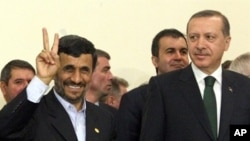Listen to Susan Yackee's interview with Wayne White, a scholar at the Middle East Institute, on Iran - Tureky nuclear swap deal:
Iran says it has agreed to send at least half of its uranium stockpile to Turkey in a swap for nuclear fuel, marking a possible breakthrough in a stalemate over its nuclear program.
Under a deal forged with Turkey and Brazil, Iran would hand over 1,200 kilograms of low-enriched uranium to Turkey. In exchange, Tehran would receive further enriched nuclear fuel.
It was not immediately clear where the processing would take place. Foreign Minister Manouchehr Mottaki said Tehran will send information to the International Atomic Energy Agency within a week.
"Further details of the exchange will be elaborated through a written agreement and proper arrangement between Iran and the Vienna Group that specifically committed themselves to deliver 120 kilograms of fuel needed for the Tehran research reactor PRR," he said.
If the agreement goes through, it could slow the growing momentum for a fourth round of international sanctions on Iran over its disputed nuclear program. The United States and others worry Iran is trying to develop nuclear weapons, which require even more highly enriched uranium. Iran denies the charge, saying its nuclear program is intended for peaceful purposes.
The outline of the swap appears much the same as one proposed by the United Nations nuclear agency last year, with Russia and France designated as the countries for swapping and enrichment.
By taking uranium out of Iran, international powers hope to buy time to persuade Tehran to allow full monitoring of its nuclear program by the IAEA.
The latest IAEA report suggests 1,200 kilograms of low-enriched uranium would amount to just over half of Iran's stockpile.
Iran initially agreed to the previous deal, then spent months expressing varying degrees of commitment and proposing alternate scenarios, including a swap on Iranian territory. It also continued to enrich uranium.
Turkey and Brazil are seen as more amenable partners to Iran, in part because they have opposed the idea of more sanctions. Both countries are non-permanent members of the U.N. Security Council. The agreement also gives Iran a central role in choosing where the uranium would go.
Turkish Foreign Minister Ahmet Davutoglu says the deal should alleviate international concerns.
"For us, now there is no grounds anymore for new sanctions or measures," he said. "It is now time to discuss, as has been mentioned in the text, Iran will write a letter to the IAEA, and we hope that IAEA in Vienna will react quickly and positively, so that there will be a result in a very short period of time."
Brazil's Foreign Minister, Ceslo Amorim, characterized the deal as a first, but important step.
"The right of Iran is assured by the NPT to have peaceful activities in the nuclear area, including enrichment, but also that they offer guarantees to the international community that these activities are not being deviated for military purposes," said Amorim. "Of course, these agreements that we wrote today will not answer all the questions but it is a precondition, in a way, for continuing the negotiation. That is what other countries have always said, that it was necessary to have this agreement, the swap agreement, in order to continue the conversation."
Initial reaction to the deal from Europe has been guarded.

